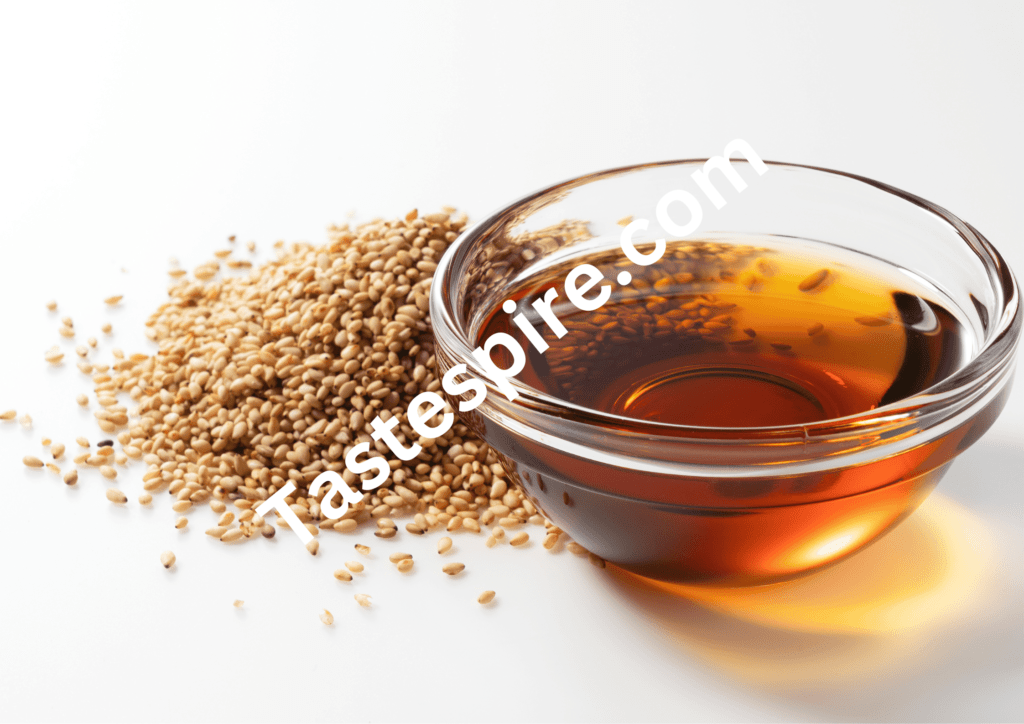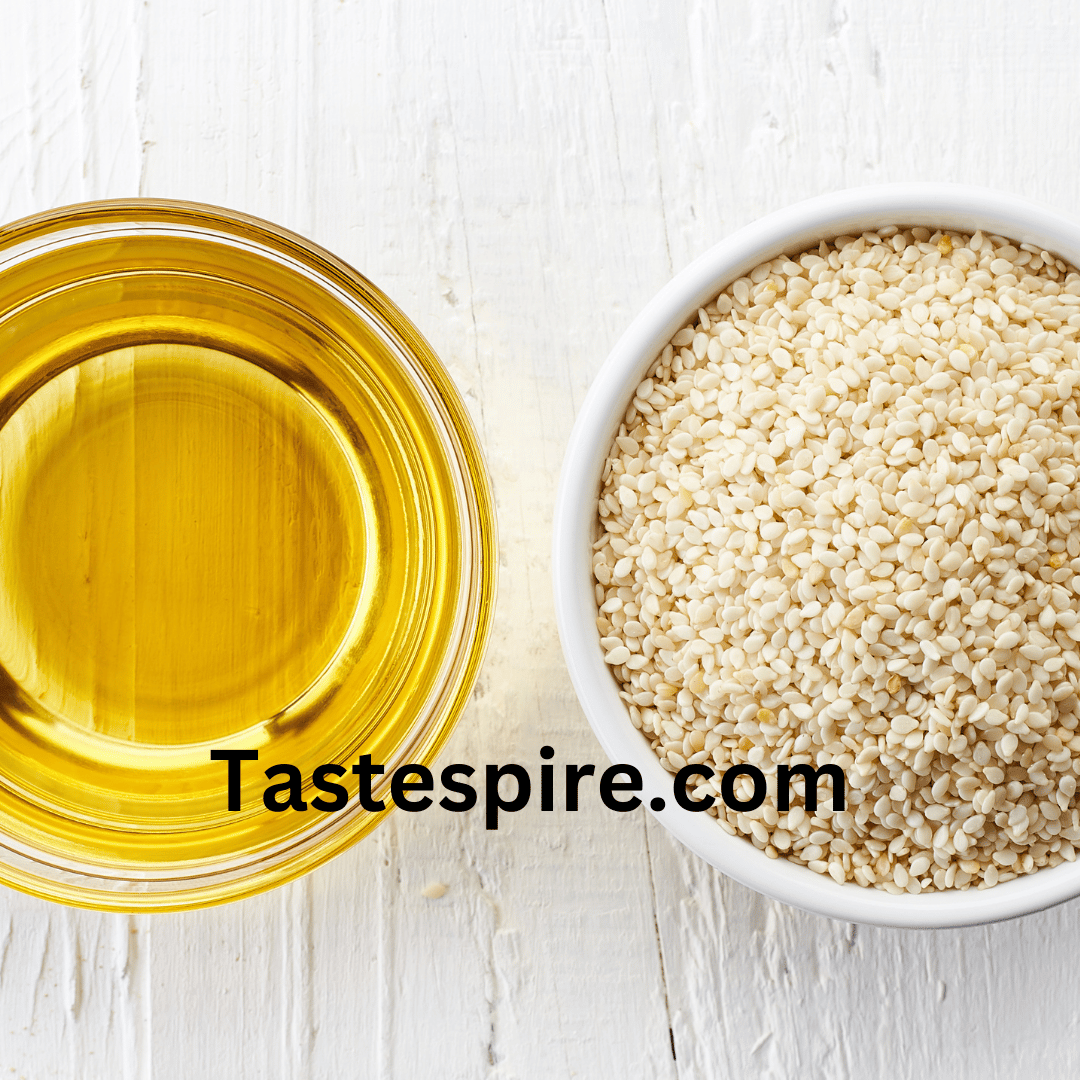In the world of cooking and culinary delights discovering suitable alternatives to Sesame Oil is a quest that holds significant importance. Whether you’re a seasoned chef or a home cook experimenting in the kitchen knowing your options can truly elevate your dishes. Our goal in this blog post is crystal clear to provide you with the most comprehensive guide on Sesame Oil Substitutes.
Navigating the vast landscape of cooking oils can be quite a task especially if you’re seeking substitutes that align with different cuisines and dietary preferences. Fortunately we’re here to simplify this journey for you. Let’s dive into the fascinating world of Sesame Oil Substitutes exploring their flavors, uses and how they can enhance your culinary adventures.
Table of Contents
Understanding Sesame Oil

Sesame oil extracted from sesame seeds is a flavorful and versatile cooking oil. It’s made through a simple yet meticulous process of pressing these tiny seeds. To extract the oil the sesame seeds are cleaned, roasted and then pressed. This process yields two main types of sesame oil light and dark.
In traditional Asian cooking sesame oil is akin to a treasured gem. Its pleasant flavor free from unpleasant aromas adds a special touch to various dishes. It plays a pivotal role in enhancing the taste and aroma of stir-fries, marinades and dressings. Its stable nature means it resists going rancid easily making it a reliable choice in the kitchen.
Moreover sesame oil offers notable health benefits. According to authoritative sources like the American Botanical Council sesame oil is nutrient-dense and naturally anti-inflammatory. It boasts a high concentration of polyunsaturated fatty acids. These qualities not only make it a flavorful addition to your meals but also a potentially valuable component of a balanced diet. So as we explore Sesame Oil Substitutes it’s essential to keep these qualities in mind.
Smoke Points and Flavor Profiles
When it comes to cooking oils two critical factors to consider are their smoke points and flavor profiles. Let’s delve into these aspects to understand their significance in selecting sesame oil substitutes.
1. Smoke Points:
- The smoke point of an oil is the temperature threshold where it initiates smoking and undergoes decomposition. This is a pivotal consideration because when an oil smokes it can impart an unpleasant flavor to your dishes and lose some of its nutritional value. Therefore it’s crucial to choose a sesame oil substitute with an appropriate smoke point based on your cooking method.
2. Flavor Profiles:
- Different oils offer distinct flavor notes that can significantly impact the taste of your dishes. For instance some oils possess a nutty or earthy taste while others are more neutral. The choice of oil should align with the desired flavor of the dish.
Now let’s explore some common substitutes for sesame oil and their respective smoke points and flavor profiles:
- Peanut Oil: Known for its nutty flavor and high smoke point peanut oil is excellent for sautéing, frying and wok frying.
- Perilla Oil: This oil offers a nutty and earthy flavor with a hint of licorice and anise. It’s best used in salads, dressings and sautéing.
- Canola Oil: With a neutral flavor and a high smoke point canola oil is suitable for shallow and deep frying, baking and cooking.
- Walnut Oil: Walnut oil has a warm, nutty flavor and is perfect for salads, dips and sauces due to its low smoke point.
- Macadamia Oil: This oil has a mild buttery flavor and a high smoke point making it suitable for various cooking methods.
- Almond Oil: Almond oil has a mild sweet flavor. It’s best for baking and adding a delicate touch to dishes.
- Olive Oil: Olive oil with its neutral flavor and versatility is ideal for regular cooking, baking and salads. Extra virgin olive oil has a lower smoke point but offers a more robust flavor.
- Flaxseed Oil: This oil has a nutty flavor and is rich in Omega-3 fatty acids. However it has a low smoke point and is best used in salads, dips and sauces.
- Grapeseed Oil: Grapeseed oil is versatile with a neutral flavor and a high smoke point suitable for various cooking methods.
- Avocado Oil: While it has a neutral flavor avocado oil adds a creamy texture to dishes. It’s great for sautéing, baking and pan-searing.
- Coconut Oil: With a mild nutty flavor coconut oil is excellent for baking and medium- to low-flame cooking. Refined coconut oil boasts an elevated smoke threshold.
- DIY Sesame Oil: You can make your own sesame oil by blending sesame seeds with a neutral oil. While it’s easy it won’t replicate the health benefits of pure sesame oil.
- Toasted Sesame Seeds: These seeds offer a nutty flavor but lack the oiliness of sesame oil. They work well as a dry sprinkle on salads and dishes.
Understanding the smoke points and flavor profiles of these substitutes will help you make informed choices when replacing sesame oil in your recipes.
13 Best Sesame Oil Substitutes:
If you’re searching for the perfect sesame oil substitute we’ve compiled a list of top contenders to suit various culinary needs. Each substitute comes with its unique flavor, smoke point and recommended uses ensuring you can seamlessly adapt them to your recipes.
List of the top sesame oil substitutes:
- Peanut Oil
- Perilla Oil
- Canola Oil
- Walnut Oil
- Macadamia Oil
- Almond Oil
- Olive Oil
- Flaxseed Oil
- Grapeseed Oil
- Avocado Oil
- Coconut Oil
- DIY Sesame Oil
- Toasted Sesame Seeds
Peanut Oil

Flavor:
- Peanut oil boasts a distinctive nutty and robust flavor that elevates your dishes with its unique depth.
Smoke Point:
- With a high smoke point of 440°F (227°C) peanut oil is a champion in the kitchen standing up to high-heat cooking methods.
Best Used For:
- This versatile oil shines in stir-frying deep-frying and wok-frying, particularly in Asian cuisine where it imparts its rich and satisfying taste. It’s a trusted choice for achieving that perfect stir-fry texture and flavor.
Nutritional Benefits:
- Peanut oil is not just a flavor enhancer it’s also good for your heart. Packed with compounds that inhibit the absorption of cholesterol it supports cardiovascular health. Furthermore it’s a rich source of both monounsaturated and polyunsaturated fats contributing to your overall well-being. When you choose peanut oil, you’re not just getting incredible flavor you’re also making a heart-healthy choice in your cooking oil.
Perilla Oil

Flavor:
- Perilla oil delivers a captivating blend of nutty and earthy notes with intriguing hints of licorice and anise making it a delightful addition to your culinary creations.
Smoke Point:
- With a smoke point of 327°F (164°C) perilla oil is best used in low to medium-heat cooking and shines in applications that don’t require intense heat.
Best Used For:
- This distinctive oil is your go-to for elevating salads crafting exquisite salad dressings and drizzling over stir-fries. It imparts a bold and nutty taste with a hint of complexity transforming your dishes into culinary delights.
Nutritional Benefits:
- Perilla oil isn’t just about flavor it’s a powerhouse of nutrition. Rich in omega-3 fatty acids it supports both brain and heart health. Moreover it exhibits anti-inflammatory properties making it a beneficial addition to your diet. When you choose perilla oil you’re not only enhancing your dishes but also promoting your well-being.
Canola Oil

Flavor:
- Canola oil is known for its neutrality in flavor making it an excellent blank canvas for your culinary creations.
Smoke Point:
- With a smoke point of 400°F (204°C) canola oil is versatile and suitable for a wide range of cooking methods including shallow and deep frying, baking and cooking.
Best Used For:
- This adaptable oil is your kitchen workhorse suitable for various applications where you desire a neutral taste that won’t overpower your dishes. Whether you’re frying up crispy delights or baking tender treats canola oil can handle it all.
Nutritional Benefits:
- Canola oil shines when it comes to health benefits. It’s low in saturated fats, making it a heart-healthy choice. Additionally it contains omega-3 and omega-6 fatty acids essential for overall well-being. By choosing canola oil you’re not only ensuring culinary success but also supporting your health.
Walnut Oil

Flavor:
- Walnut oil boasts a warm and nutty flavor profile that can elevate your dishes with its rich taste.
Smoke Point:
- This oil has a relatively low smoke point of 225°F (107°C) making it unsuitable for high-heat cooking methods.
Best Used For:
- Walnut oil shines in applications where low-heat is involved. It’s an excellent choice for enhancing salads creating flavorful dips and crafting delicious sauces. Its delightful nutty taste adds depth to your culinary creations.
Nutritional Benefits:
- Walnut oil doesn’t just bring flavor it also offers health benefits. It’s rich in antioxidants and healthy fats making it a valuable addition to your diet. Notably it can promote gut health contributing to your overall well-being.
Macadamia Oil

Flavor:
- Macadamia oil offers a mild and buttery flavor profile that complements a wide range of dishes.
Smoke Point:
- While the smoke point of macadamia oil can vary it generally falls on the high side, making it suitable for various cooking techniques.
Best Used For:
- Thanks to its mild flavor and high smoke point macadamia oil is a versatile substitute that can seamlessly replace sesame oil in most recipes. It adapts well to different cuisines and cooking styles.
Nutritional Benefits:
- Macadamia oil boasts a healthy nutritional profile. It’s rich in monounsaturated fats which are good for heart health and it contains antioxidants that can contribute to your overall well-being.
Almond Oil

Flavor:
- Almond oil offers a mildly sweet flavor that can add a delicate touch to a variety of dishes.
Smoke Point:
- The smoke point of almond oil can vary but it generally falls on the high side making it suitable for various cooking methods.
Best Used For:
- Almond oil is an excellent choice for enhancing the flavor of baked goods and adding a subtle yet enjoyable taste to your dishes.
Nutritional Benefits:
- Almond oil is a source of vitamin E and healthy fats which can contribute to your overall well-being.
Olive Oil

Flavor:
- Olive oil can have a neutral or robust flavor depending on the type you choose.
Smoke Point:
- The smoke point of olive oil can vary with extra virgin having a lower smoke point than refined varieties.
Best Used For:
- Olive oil is versatile and suitable for regular cooking, baking and salads. Extra virgin olive oil with its more intense flavor is perfect for drizzling over dishes.
Nutritional Benefits:
- Olive oil is rich in healthy monounsaturated fats and antioxidants contributing to heart health.
Flaxseed Oil

Flavor:
- Flaxseed oil has a nutty flavor.
Smoke Point:
- It has a low smoke point of 225°F (107°C).
Best Used For:
- Ideal for salads, dips and sauces due to its low smoke point. It adds a warm nutty flavor to dishes.
Nutritional Benefits:
- Flaxseed oil is rich in omega-3 fatty acids and other nutrients promoting brain and heart health.
Grapeseed Oil

Flavor:
- Grapeseed oil has a neutral flavor.
Smoke Point:
- It boasts a high smoke point of 420°F (215°C).
Best Used For:
- This versatile oil is suitable for sautéing, frying, deep-frying, wok frying, baking and more.
Nutritional Benefits:
- Grapeseed oil contains monounsaturated and polyunsaturated fats with little to no saturated fats making it a heart-healthy choice.
Avocado Oil

Flavor:
- Avocado oil has a neutral flavor with a creamy texture.
Smoke Point:
- It boasts an impressively high smoke point of 520°F (271°C).
Best Used For:
- This oil is ideal for high-heat cooking, including sautéing, baking and pan-searing. It adds creaminess to dishes.
Nutritional Benefits:
- Avocado oil is rich in heart-healthy monounsaturated fats and essential vitamins.
Coconut Oil

Flavor:
- Coconut oil has a mildly nutty flavor.
Smoke Point:
- The smoke point can vary, with refined coconut oil having a higher smoke point.
Best Used For:
- It’s suitable for baking and medium- to low-flame cooking. Refined coconut oil is a better choice for cooking due to its higher smoke point.
Nutritional Benefits:
- While it contains beneficial compounds it should be used in moderation due to its saturated fat content.
DIY Sesame Oil

Flavor:
- DIY sesame oil can replicate sesame oil’s flavor depending on the base oil used.
Smoke Point:
- The smoke point varies depending on the base oil used.
Best Used For:
- DIY sesame oil is best for making your sesame oil blend. However it may not replicate the full health benefits of pure sesame oil.
Toasted Sesame Seeds

Flavor:
- Toasted sesame seeds have a nutty flavor.
Smoke Point:
- N/A (used as dry sprinkles).
Best Used For:
- Ideal for sprinkling over salads and dishes to add a nutty flavor. However it does not provide oiliness or serve as a binder.
Nutritional Benefits:
- While toasted sesame seeds offer health benefits it lacks the oil consistency of sesame oil.
By understanding the flavors, smoke points and nutritional benefits of these sesame oil substitutes you can confidently choose the right one for your culinary needs ensuring delicious and healthy results.
Frequently Asked Questions (FAQs) About Sesame Oil Substitute
What Are the Substitutes for Toasted Sesame Oil?
Substituting toasted sesame oil requires finding alternatives with a robust nutty flavor. Perilla oil is a top choice along with walnut oil, peanut oil and macadamia oil. These options capture the desired nuttiness.
Can You Substitute Olive Oil for Sesame Oil?
Yes, you can use olive oil as a substitute for sesame oil in various dishes but keep in mind that the flavor is milder. Extra virgin olive oil offers a more pronounced taste suitable for drizzling or enhancing certain recipes.
Can You Substitute Sesame Oil for Vegetable Oil?
While you can substitute sesame oil for vegetable oil remember that sesame oil has a distinctive flavor that may influence the dish. Consider the flavor profile you desire as vegetable oil has a neutral taste.
What Are the Substitutes for Sesame Oil in a Stir-Fry?
When stir-frying choosing an oil with a high smoke point is crucial. Peanut oil is an excellent sesame oil substitute for stir-frying due to its high smoke point (440°F). Canola oil and sunflower oil are also suitable choices.
What Are the Substitutes for Sesame Oil in Fried Rice?
Fried rice can accommodate various cooking oils. Canola oil is widely used for fried rice due to its neutral flavor and high smoke point. You can also explore other neutral oils like sunflower oil.
How Can I Make My DIY Sesame Oil?
Crafting your own sesame oil is simple. You’ll need a cup of neutral-flavored oil (like vegetable, canola or sunflower oil) and ¼ cup of sesame seeds. Heat the ingredients in a heavy-bottomed pan for 2 minutes cool them blend, and strain.
Can You Use Toasted Sesame Seeds as a Substitute for Sesame Oil?
Toasted sesame seeds can be used as a substitute for sesame oil if you desire a nutty flavor. However they don’t provide the oil consistency and can’t serve as a binder. Use them as dry sprinkles over salads and dishes for added flavor.
What Can I Use if I Don’t Have Sesame Oil?
If you don’t have sesame oil you can opt for various alternatives based on your desired flavor profile. For a nutty taste consider substitutes like peanut oil, perilla oil or almond oil. If a neutral flavor is suitable try canola oil, olive oil or grapeseed oil.
What Oil Is Closest to Sesame Oil?
While no oil perfectly replicates sesame oil’s unique flavor toasted sesame oil comes closest. However if you’re looking for alternatives perilla oil offers a similar nuttiness making it a good option for certain recipes.
How Important Is Sesame Oil in a Recipe?
Sesame oil plays a crucial role in many Asian cuisines providing a distinct nutty and toasted flavor. In recipes where it’s a primary flavor component such as stir-fries and dressings sesame oil is essential. However its significance can vary depending on the dish and suitable substitutes can be used if needed.
Conclusion:
In conclusion we’ve embarked on a flavorful journey through the world of sesame oil substitutes. We started by understanding the importance of these alternatives recognizing their value in enhancing diverse cuisines and dietary preferences.
Exploring the realm of sesame oil we’ve learned about its production process its traditional role in Asian cooking and its impressive health benefits all backed by authoritative sources.
We’ve delved into the crucial concept of smoke points in cooking oils unveiling how they influence our choice of substitutes. We’ve also taken a closer look at a variety of sesame oil substitutes from peanut oil to toasted sesame seeds understanding their unique flavor profiles smoke points and nutritional advantages.
In our quest for the best sesame oil substitutes we’ve unearthed options for every palate and cooking method. From the nutty allure of almond oil to the versatility of grapeseed oil we’ve armed you with a culinary arsenal that can elevate your dishes to new heights.
Finally we’ve addressed common questions surrounding sesame oil substitutes ensuring you have all the information needed to make the best choices in your cooking adventures.
As we wrap up this comprehensive guide we want to encourage you to unleash your inner chef and experiment with these substitutes. Whether you’re striving for a specific flavor or accommodating dietary needs these alternatives can help you create delightful dishes that burst with flavor. So go ahead explore and let your taste buds lead the way to delicious culinary experiences.
